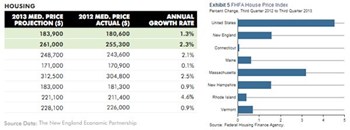
Local real estate professionals contend that the market for condominiums is on a slow and, generally steady, uptick all over New England, but the place to sell a condo right now is definitely Boston, with an inventory that cannot meet demand. Outside of Boston, however, the general trend seems to be a more manageable growth as the real estate industry slowly climbs out of the dark years of foreclosures and halted construction.
Realtors in Rhode Island, for instance, have seen the median price of a housing unit slowly climb as a long-distressed market bottomed out and is rebounding. In the spring of 2013, the Rhode Island Association of Realtors (RIAR) reported that the sales price of single family homes that began climbing late in 2012 continued through first quarter sales and rose nine percent in March 2013 from March 2012.
Susan Arnold, CEO of the Rhode Island realtors association, notes that “condos [sales] are very strong right now, although there has not been a huge inventory of condos in Rhode Island, where it’s more single-family detached and multi-family rental properties. Even at that, there was a time—a few years ago—when it was a real challenge for the condo market… but in the past two years, everything is selling. Some areas that suffered the most, such as here in Rhode Island, have made a fairly rapid recovery. Reports that we’re getting are showing solid gains… Sales have been rising since 2012, up to 60 percent over last year. The median price in September was up about 10 percent over last year.”
“Condominiums appeal to a lot of demographics,” she continues, “and a broad spectrum of buyers, from young couples and singles looking for a starter home, to those looking for a retirement option. Condos are a good choice for buyers who can’t or don’t want to do the maintenance and yard work of a single-family.”
One caveat impacting sales in the state, as well as other coastal regions and even river valleys in the Green and White Mountains up north, is implementation of the Biggert-Waters Act, which passed in July of 2012. The Biggert-Waters Flood Insurance Reform Act of 2012 (BW-12) was passed by Congress to extend the National Flood Insurance Program (NFIP) for five years, with stricter controls. The law will mean increases in the cost of flood insurance, expanded flood hazard mapping and more management of floodplains. The changes will be phased in over time. Because flood insurance maps are being redrawn, many properties that never before needed to get flood insurance will now be required to have it—and at higher rates. Condo buyers today are not only facing potentially higher insurance rates, but as a double whammy, they’re seeing changing—and tougher—mortgage requirements.
Is Your Association FHA-Ready?
The fallout from the nation’s renegade mortgage industry is slowly being resolved, as the rate of foreclosures has slowed down but condo owners often have more than mortgages to deal with. “Among condo communities,” states attorney Henry Goodman, principal in the Dedham, Massachusetts, and Lincoln, Rhode Island, based law firm of Goodman, Shapiro & Lombardi, LLC, “we are seeing that foreclosures due to mortgage non-payment are down. However, foreclosures for non-payment of [condo] fees are not back down to where they should be.”
He notes that mortgage qualifications have tightened up and people trying to purchase a condo may need more creative options for financing.
To reach out to potential buyers, Goodman says, “Some local banks have been ‘warehousing’ mortgage money… so they won’t have to depend on Fannie Mae [Federal National Mortgage Association] or Freddie Mac [Federal Home Loan Mortgage Corp.].”
He points out that the presence of Fannie and Freddie diminished greatly—especially as to persons with small down payments—after the mortgage industry debacle, and “the FHA [Federal Housing Administration] has taken up the slack… but some condo associations don’t qualify for FHA programs.” An FHA loan is simply a mortgage from a regular banking institution that is insured by FHA. This federal-government insurance assures lenders of less risk since they will be repaid in the event of default. Since 1934, the FHA and HUD have insured over 34 million home mortgages and about 47,205 multifamily project mortgages.
Why does this matter? A report from FHA states, “In 2006, FHA loans accounted for less than 2% of the mortgage market; now almost half of all new mortgages are FHA. Due to recent changes in federal law and policy, it is now necessary for an entire condominium or townhome development to obtain FHA approval from HUD in order for an FHA loan (purchase or refinance) to be possible for even a single condo or townhome unit.”
Some of the major requirements that associations must meet for FHA approval include: no more than 15 percent of units can be [more than 60 days] late in paying fees; at least 50 percent of the project must be owner occupied; the reserve fund must be at least 10 percent of the budget; there is no pending litigation aside from collections or foreclosures; and flood insurance is mandated for properties within the 100-year floodplain.
Markets Vary, But One is Zooming
Rick Scherer is vice president of sales at MSA Mortgage in Framingham, Massachusetts. He says that condo markets vary considerably all over New England. “It’s really localized… Boston, for instance, never really got hit bad. It depends on where you are. Places like Worcester and Springfield, that had flat-lined, are now picking up very gradually, and with glitches. New residential construction is still down a bit—in many areas, people still don’t have jobs.”
This contrasts with a Boston market, he notes, where “almost 70 percent of current sales are in condos. It’s all you can buy in Boston now. We’re seeing a lot of people selling a house in the suburbs and getting into a walkable neighborhood. It’s a noticeable trend.”
“We had one client who bought a condo conversion in the South End… a rehab of an old brownstone, for $1.16 million. South End prices are getting ridiculous; it’s like the Back Bay. First-time buyers are getting into South Boston [because] the lack of inventory in this market is unbelievable. Recently, a unit in a converted three-decker in Jamaica plain sold for about 15 percent above the asking price. In Charlestown, an existing building was incorporated into a new development where an 1,800 square foot unit sold for $1.03 million.”
“This means that contractors are busy,” he adds. “A lot of people are converting multi-families into condos and selling them.” This mini-industry has demanded new ways of financing. “We have an alternative lending specialist,” Scherer reports, “who has ‘hard’ money and can fund something in five days and skip the mortgage companies. Although it’s at a high interest rate, 12–15 percent, it’s like a bridge loan… you’re in and out quickly.”
The Return of Bidding Wars?
Scherer points out that when flipping properties this way, “It’s hot for one week, but after 30 days [unsold] you know it was over-priced. There are buyers out there for every product [in Boston] but if they’re still on the market there’s a pricing issue. If there’s a condo in the $300,000-$400,000 range it barely gets listed before it’s sold…. this market is creating bidding wars.”
“In the 1980s,” he continues, “people fled to the suburbs,” leaving multi-families in the city that have been converted to condos. “So there’s a big difference today in the increased percentage of condo units in Greater Boston,” he says, but it’s still not enough. “I think if there were 20 percent more condo units in Boston’s inventory, there would be more of a nice, healthy, humming market.”
Others in the industry agree. Ted Tye, managing partner in National Development, based in Newton, Massachusetts, observes, “There’s something happening in Boston. There’s a great flight to the city [and] all its amenities. Boston is probably the most livable among cities in New England. The demand for condos is pretty different from what you’ll find in the suburbs. There’s not enough supply right now, at just over 600 units for sale within Boston—that’s the number from Multiple Listing Service—and it hasn’t been that low since the 1990s. Because we’re seeing increasing rents and low mortgage rates… It’s the perfect alignment of the stars to promote condo sales.”
Tye’s company is developing a major project in the South End—the Ink Block condos and apartments on the six-acre former site of the Boston Herald. “We’re seeing a mix of buyers in the Ink Block, empty nesters from the suburbs, singles, young couples, former renters who are seeing rising rents,” he states. “Boston has a lot of international grad students, researchers and medical professionals,” he adds, who can fuel a market for new condos that can demand prices from $500,000 to $2 million. “South Boston is the most rapidly-changing area right now, and in the next couple of years, there will be 1,500 new housing units in this neighborhood, counting the Ink Block along with two neighboring developments,” Tye reports.
“The Ink Block started out as all rental units but has evolved to meet the demand for condos,” he points out, and admits that plans can always change. “Everything rides on the economy in general, and the rate of unemployment… We’ll be re-making a whole city block, so we’ll see what the market demands when we get closer to build-out.”
“The South End had 352 property sales which were over $500,000 between January and September” of 2013, says Tye, but points out that the current high demand and hot market has a lifespan of its own and won’t last forever. “Eventually, this window closes, so you have to bring your product [the Ink Block] to market quickly.”
Marie N. Auger is a freelance writer and a frequent contributor to New England Condominium.






Leave a Comment